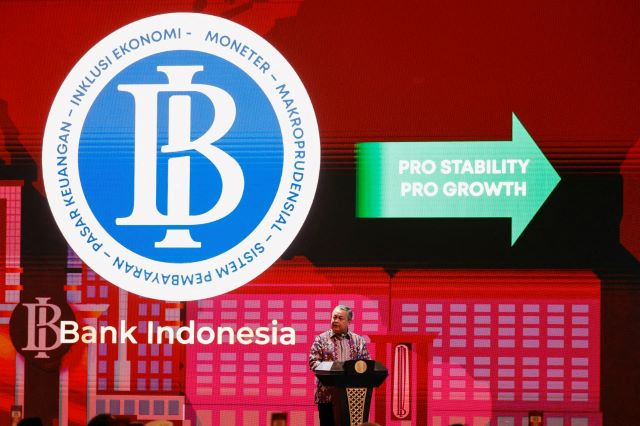Popular Reads
Top Results
Can't find what you're looking for?
View all search resultsPopular Reads
Top Results
Can't find what you're looking for?
View all search resultsTurning point for the Fed, BI
BI deserves praise for its careful recalibration of monetary policy in recent years, from the stimulus needed after COVID-19 had strangled economic activity in 2021 to anti-inflation measures.
Change text size
Gift Premium Articles
to Anyone
I
n its final policy meeting of the year on Dec. 21, Bank Indonesia (BI) kept its key interest rate unchanged at 6 percent, as widely expected. With very little action in terms of interest rate changes, one could mistake 2023 for an easy year for Indonesia’s central bank, but that is far from the truth.
BI’s monthly policy meetings required careful consideration as pressure on the rupiah remained high throughout most of the year as interest rates in the United States rose, pushing up the dollar.
After BI had signaled that its 25-basis-point (bps) hike in January was going to be the final one in this cycle, the US Federal Reserve kept increasing its federal funds rate for half a year to the highest level in more than two decades.
In a move that took traders by surprise, BI responded by lifting its rate one more time in October. Given that inflation was low at the time, this was clearly a preemptive measure to buttress the national currency in the face of Fed action.
BI Governor Perry Warjiyo has consistently communicated his institution’s focus on “rupiah stability”.
In all likelihood, this marks the turning point for both the Fed and BI, with analysts widely expecting the next rate change for both central banks to be a downward one.
The dollar is now trending downward, and even the Fed’s messaging of “higher for longer” rates has ended after achieving its intended effect on inflation expectations, with more analysts now expecting an earlier reduction in the federal funds rate.
Reuters reported on Tuesday that markets were now pricing in a 75 percent chance of a 25-bps rate cut from the Fed in March and were “pricing in more than 150 basis points of rate cuts next year.”
In a research note sent out on Dec. 23, Bank of America said it thinks “that quarterly rate cuts [in Indonesia] could begin earlier from 1Q24 (vs. 2Q24 previously).” The US investment bank believes Indonesia’s central bank could then track a Fed rate cut trajectory that may bring the BI rate down to 5 percent by the end of next year.
Looking back at the past years, BI deserves praise for its careful recalibration of monetary policy in recent years, from the stimulus needed after COVID-19 had strangled economic activity in 2021 to anti-inflation measures as food and commodity prices spiked in 2022 and finally to rupiah support amid Fed action in 2023.
Perry has kept the country steady in rough seas, demonstrating foresight on macroeconomic trends, as seen in the latest rate increase, which proved to have been very timely when inflation rose again in the following two months.
BI seemed asleep at the wheel for a few months when it kept its rate at a low 3.5 percent in 2022 while the Fed was already busy hiking, but got away with it as global inflationary pressure began to ease off somewhat just in time.
Perry also engaged in effective cooperation with Finance Minister Sri Mulyani Indrawati. BI helped fund exceptional government expenditure during the coronavirus crisis, while the government helped to contain inflation through active measures aimed at keeping staple food prices under control.
That cooperation has certainly reassured markets about Indonesia’s financial system stability and helped avoid an excessive selloff of Indonesian assets by global investors as US monetary policy was tightened.
We hope that next year will be a less tumultuous one for monetary policy as 2024 begins with a completely changed macroeconomic context, thanks to the economic slowdown in advanced economies finally reflecting in lower inflation.
The prospect of dropping interest rates bodes well for overall economic activity, particularly in emerging markets like Indonesia, because the lower value of money should propel credit growth.
The government also has scope to increase spending, and by mid-2024, the uncertainty of the presidential election should be behind us.
It could be a happy new year indeed.











